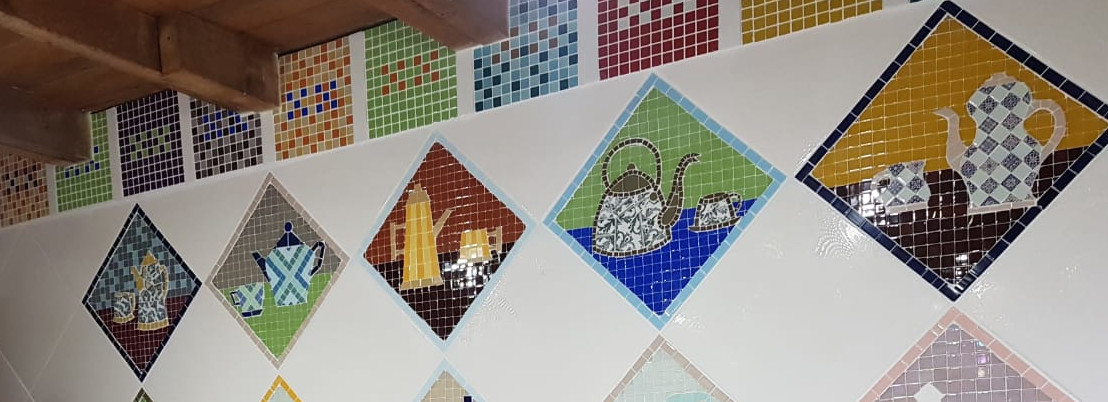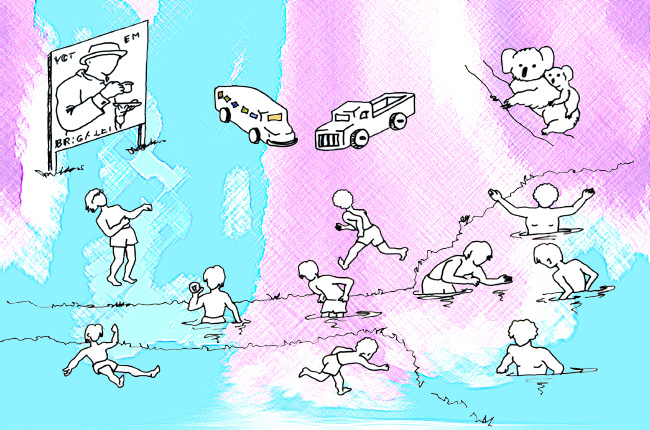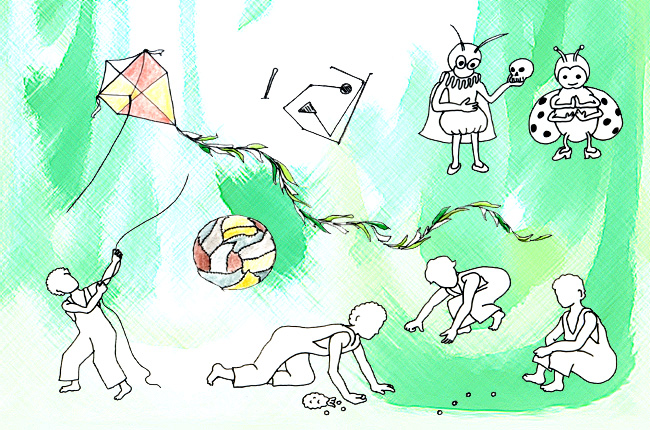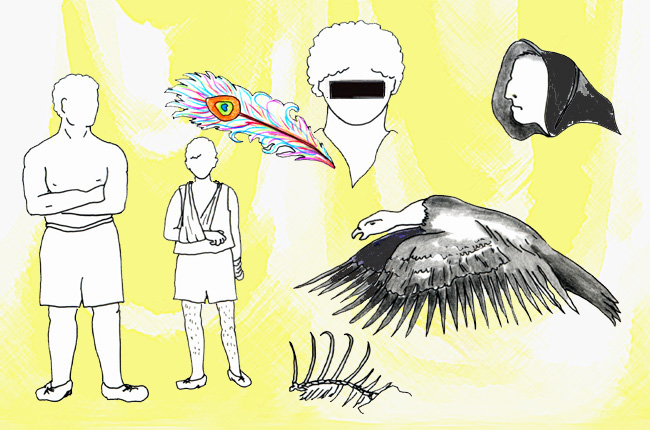14. Mermaids, trucks, the happiness of the child covers more than one chapter
Translated by Angela Telles-Vaz
It’s comforting to realize that my lost joys surpass one chapter. For what comes after the memories of those playful mornings, seems more like a night of nightmares.
There are memories of those days that are so bright, so warm and so magical, that I think with no exaggeration, they are sufficient for a lifetime. Maybe they don’t represent anything for another child. For us there, stripped of everything that was considered superfluous, for us, tiny Diogenes under pressure, with no gourd to drink water and a crumbled mattress as a barrel, for us, a lump of clay was enough. A floor. Medals would be stolen and lined up in some safety pin. Marbles would end up inside the little swollen bags of the so called aimers. Paper for the kite and ball were mysteries to which we had no access, belonging to the older ones by an unknown natural order. I don’t remember having ever contemplated whether I would or not be entitled to such wonders. It had to be that way and that was all there was to it.
We the younger children got lost and forgotten within ourselves, drawing on the ground. Gradually, primitive panels were assembled, how it’s easy to understand the prehistoric art. Nothing was sacred, either taboo or magical. We made drawings because we found out by chance that it was possible to draw. The only word which I admit that can be applied to that specific situation is Identification. In one way or another, each of those events indicated one object we could relate to emotionally or intellectually, consciously or unconsciously. Could someone figure out what was that good for?
There’s much talk about pragmatic art, natural and social function… I think about the inhabitants of Altamira, rubbing the tiny colored pigments on the cave walls. And now through observing, from this side of the wall, that silent and distracted bunch of children drawing on the ground, it seems that I’m facing the birth of something free and playful, of vague and unknown intentions from themselves, escaping the purpose of consciousness.
We drew mermaids and trucks. More mermaids than trucks. First, the sand was smoothed out and the pebbles and the rubbish were taken out. Afterwards, the finger ran fast and a multitude of mermaids were shaped, without scenery and without any proportion between the figures. Each one of those drawings was sufficient to itself, not linked to another and, if at some point a tail of a mermaid went on top of the face of another already finished, we would go over it, having then an overlaying of images. What mattered was the drawing while it was being drawn. After the figure was finished, the urge for a new creation abandoned the newborn and began another creature.
The main thing, however, was our pottery. We made clay figurines. Oxen, horses, I remember a dog; one of my friends made a dog sitting on his hind legs. The kangaroos had the tiniest kangaroo faces inside their tiny pouches. The elephants had trunks, sometimes down, sometimes raised over their heads. Many ducks, with wings always opened. Ducks, geese, swans, a bird represented them all.
The figurines were molded and the clay cracked quickly. To smooth it the finger was wet with spit and soon all fingers and lips looked brown due to the dirt of the clay. Then the figurines sat under the sun. I don’t remember playing with that. I remember doing the figurines and then forgetting them.
However, our little cars made all the rest to be something distant and useless. We spent hours and hours molding our cars, buses and trucks with care.
With time, we got more sophisticated. I don’t remember any particular idea given by me. I was always copied others and my shyness completely hampered the personal impulse. The wheels with wooden shaft were the first mark of originality. We did the little car, the wheels, and linked them to the car using a toothpick fixed to the chassis by means of a small piece of clay. Once dried it was possible to move the vehicle. I think that Valdemar did a hollow bus, putting glass in the windows. There followed a series of hollow buses with multicolored glass. It was genius when Hermes made a hollow car front, with toothpicks lined up, pretending to be the bars of a radiator. It was a job long and lacking in precision. Nevertheless, the results were capable of filling the week with enchantment.
Only two details of these happy hours are left: the fire stones and the stream.
From time to time, all the kids kept fire stones to rub them against one another during the night. The fast and weak spark had the value of a gold coin. What was boring was the noise. And because there was an excessive liking for that, before bedtime there was an endless hammering, here and there, fireflies sound, cracking lights, ephemeral and noisy small lights. Each one took pleasure in his own work, anxiously waiting for a happy chance that the rubbing would produce a stronger spark. A scream, I don’t know from whom that would bring silence to those stone toads. The next day, they returned to the concert of lights until the scream again brought silence to the tiny stones. Sleeping time was amidst a smell I insisted in classifying as the sulfur smell of the devil.
What about the stream? If it was Sunday, sunny, and Antonio willing, we went to the stream. How could I be mad with that man?, that put us in line, order!, mark steps!, rest!, and then lead the cortege towards the creak. As soon as we left, I felt completely lost. It was a huge world, scattering houses, meadows, mountains far away. The dry ground came alive, we kicked the dirt, lifting up a lot of dust and so the older ones at the back scolded us.
At the bend of the road there was a gigantic poster, the beautiful drawing of a man drinking a cup of coffee. Vote for the Brigadier, we all read aloud. What a man?, what a portent?, what kind of king would he be?, that managed to make a picture that big and put it along the roadside.
The stream was small, shallow and narrow. It ended in a kind of basin, deep and wide. We played with the little ones in the shallow part. In the deeper part were the supervisor and the older ones. We were naked. They wore shorts.
It was a contagious joy. There were shouts and laughter, dives and jumps. Once, we took a rag ball with us and to our surprise it didn’t sink. We played for a long time until it suddenly disappeared. We looked for it in vain. After that happened, many years later, it occurred to me that the water certainly penetrated it slowly until the ball got heavier and went to the bottom and was taken away.
There’s a memory connected to the stream that impressed me a lot. Of equal intensity, I can only remember two other facts: the night at Ms. Leca’s house and that strange episode that I’ll call The Happening. The memory of the stream seems stronger than all the others, a mysterious heron, very clear but confusing. It may have happened more than once. But in the midst of so much fog, my memory retains only a scene.
Antonio called me and asked me if I wished to dive with him. I was never afraid of water. He bent down and asked me to ride on his back. I had to put my arms around his chest for if I held his neck he wouldn’t be able to breathe. I held firmly onto him, enveloping him like a little koala cub. Antonio was huge like a statue. He told me to breath deeply. Ready? An explosion and I felt myself wrapped around by the totality of a cold universe. Strange noises, would that be the chant of the Iara?, the mermaid of the Brazilian Natives who live in the rivers. I began to release my breath slowly, that place was confusing and extraordinary. I squeezed my arms, he gave me the maximum assurance and I knew I would not let go. The sounds finally disappeared, the humming and melodies of another world. He swam with me to the other side. I was an astonished little tick and, rather than the sensation of crossing the deep part of the stream, been there filled me with pleasure, embracing him, having my body kind of glued to his back, the sex skin tight, feeling entirely his firm and wet flesh.
It’s needless an explanation from Mr. Freud.
to be continued on next sunday.



